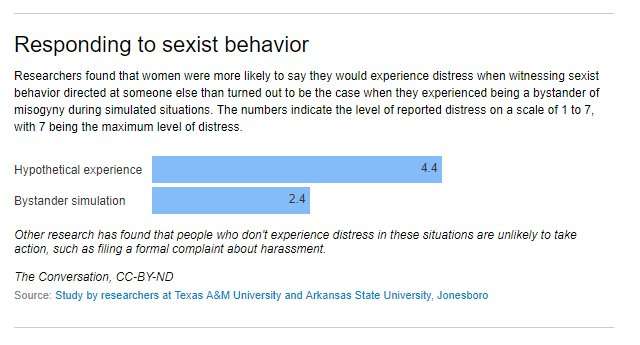Why bystanders rarely speak up when they witness sexual harassment

The uproar over allegations that Hollywood producer Harvey Weinstein sexually abused and harassed dozens of the women he worked with is inspiring countless women (and some men) to share their own personal sexual harassment and assault stories.
With these issues trending on social media with the hashtag , it's getting harder to ignore how common they are on the job and in other settings.
I have studied sexual harassment and ways to prevent it as a researcher. My research on how people often fail to speak out when they witness these incidents might help explain why Weinstein could reportedly keep his despicable behavior an for decades.
Of course, went well beyond sexual harassment, which University of British Columbia gender scholar defines as "behavior that derogates, demeans or humiliates an individual based on that indiviudual's sex."
Some of the women speaking out in the U.S. are – a crime – during encounters he says were always consensual.
But sexual harassment is such a chronic workplace problem that it accounts for of the 90,000 charges filed with the federal government's Equal Employment Opportunity Commission (EEOC) in 2015. Since only one in four victims report it, however, the EEOC and other experts say the actual number of incidents is far higher than the official number of complaints would suggest.
The usual silence leaves most perpetrators of this toxic behavior free to prey on their co-workers and subordinates. If sexual harassment is pervasive on the job, and most women don't report it, what can be done?
Some business scholars suggest that the best way to prevent sexual harassment, bullying and other toxic workplace behavior is to for their abused colleagues when they witness incidents. One reason why encouraging intervention makes good sense is that some 70 percent of women have observed harassment in the workplace, according to research by psychologist .
The trouble is that most people who witness or become aware of sexual harassment don't speak out. Screenwriter, producer and actor has both admitted to and denounced how this dynamic enabled Weinstein to become an alleged serial abuser. "Let's be perfectly clear about one thing," he wrote in a private Facebook post published in the media. "Everybody-f—ing-knew." He also said:
"in the end, I was complicit.
I didn't say s—.
I didn't do s—.
Harvey was nothing but wonderful to me.
So I reaped the rewards and I kept my mouth shut.
And for that, once again, I am sorry."
Researching how people respond
To understand why witnesses often don't speak up, a colleague and I that asked participants to review hypothetical sexual harassment scenarios and indicate if they would respond.

The results seemed promising: Participants generally said they would take steps to stop harassing behavior if they saw it happen. People indicated they'd be more likely to respond if two conditions were met: It was a – that is, if the harasser promised benefits in exchange for sexual favors – and the workplace valued diversity and inclusion. In such , there are open lines of communication, and leaders embrace diversity and inclusion.
There's a potential problem with experiments using the kind of hypothetical scenario and . People don't always do what they think they will in real-life situations. For example, psychologists find that during an emotionally devastating event than they actually do when it occurs.
Other researchers find similar patterns with . People think they will recoil and experience distress when hearing racist comments. But when they actually hear those remarks, they don't.
The same dynamics are at play when examining sexual harassment during job interviews, as illustrated in a study conducted by psychologists .
Participants, all of whom were women, expected to feel angry, confront the harasser and refuse to answer the hypothetical interviewer's inappropriate questions. Some of the questions, for example, included asking the job applicant if she had a boyfriend or if women should wear bras at work.
However, when they witnessed this simulated behavior during the experiment's mock interviews, people responded differently. In fact, 68 percent of participants who only read about the incidents said they would refuse to answer questions. Yet all 50 of the participants who witnessed the staged hostile behavior answered them.
Drawing from these studies, my team conducted in 2012 to determine how harassment bystanders would react to hearing inappropriate comments about women.
Some of the female participants read about a hypothetical scenario in which harassment took place, while another group observed harassment occurring in a staged setting. We determined that the participants, who were college students, overestimated how they would respond to seeing someone else get harassed.
The reason this matters is that people who don't feel distress are unlikely to .
Intervention training
What stops people from reacting the way they think they will?
Psychologists blame this disparity on "." People overestimate the impact that all future events – be they weddings, funerals or even the Super Bowl – will have on them emotionally. Real life is messier than our imagined futures, with social pressures and context making a difference.
This suggests a possible solution. Since context matters, organizations can take steps to to take action.
For example, they can train their staff to speak up with the or other approaches. The Green Dot program was originally designed to reduce problems like sexual assault and stalking by encouraging bystanders to do something. says this "bystander intervention training might be effective in the workplace."
Especially with workplace harassment, establishing direct and anonymous lines for reporting sexist incidents . They also say employees should not fear negative reprisal or gossip when they do report harassment.
Finally, bystanders are more likely to intervene in organizations that clear. For that to happen, leaders must assert and demonstrate their commitment to harassment-free workplaces, enforce appropriate policies and train new employees accordingly.
Until more people take a stand when they witness sexual harassment, it will continue to haunt American workplaces.
Provided by The Conversation
This article was originally published on . Read the .![]()

















